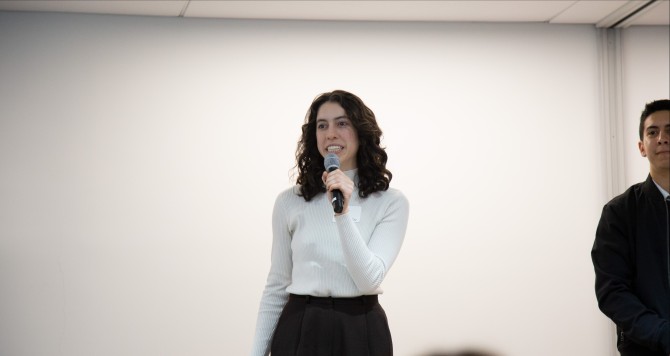An Oct. 20 pitch event in New York City offered a good sampling of the kinds of entrepreneurial ideas brewing among Cornell students -from an agricultural credit business to help Bangladeshi farmers to a glove that would help people with visual impairments learn Braille to a video platform offering personalized college tours to prospective students.
The eLab pitch event included 28 student teams who are part of the eLab student business accelerator in Ithaca, along with three teams from Cornell Tech's Runway Startup Program in New York City. The event wasn't a contest, but rather a chance for the students to share their progress so far and ask audience members - who included alumni, venture capitalists and other entrepreneurs - for their help as they move their businesses forward.
"We told the eLab students their goal for this pitch was to have audience members come up after the event and ask 'Tell Me More,' " said Ken Rother, managing director of eLab. "Judging by all the conversations going on during the networking portion of the program, I would say the students hit that mark."
Albert Matlock MBA '24 shared his company, 1000Grams, which is working to increase the availability of natural personal care products to underrepresented communities.
"We need to educate consumers about why plant-based products are better for their skin," Matlock said, adding that company's soap is already available in retail locations in New Jersey, as well as online.
Doctoral student Abigail Nason shared the idea behind FiberRev, which is working to make recycled clothing easier to obtain.
Wenjia Zong, a doctoral student and CEO of Lacuna, said her company is working with clothing designers and fashion producers to develop a more universal sizing system based on body scans and body types.
David Yoon '24 is working with partner Sean Cai '24 to create Tourable, a video college tour platform for international students. "We'll offer affordable and personalized tours," Yoon said, "and we're releasing an MVP (minimum viable product) next week with 21 universities already on board."
Kushagra Jain '22 and Lyon Li '23's Braille glove uses light and sensor technology to "read" the dots beneath a person's fingers and speak the words out loud.
"More than 90 percent of the visually impaired can't read Braille because learning it requires a tutor and tutors are expensive," Jain said. "We wanted to build a learning device that's affordable."
Rui Maki '20 M.A. '22, is a Runway fellow at Cornell Tech working on Truffle Health, a platform that helps patients understand, reduce, and pay their medical bills, all in one place.
"We've found that 80 percent of medical bills are wrong and patients are often overcharged, " Maki said. Truffle Health reviews medical bills, checking for errors and making sure insurance coverage was applied, then the platform explains the charges and offers a way for patients to pay directly from the app.
Daniel Lee '23 and James Holland MBA '23 started Halcyon Hempworks, a U.S. processor for fiber hemp. "We're helping processors weed out issues with imports by providing quality product for companies," Lee said.
Debasish Chakraborty MPA '23 launched Chamak to support farmers in his home country of Bangladesh. "Small holder farms there have insufficient access to seeds and feed," he said. By offering farm credit, warehousing space and agricultural product sales, Chakraborty said his company can improve both profits and efficiency for farmers.
"We've already piloted this with 50 farmers who have returned the money on time," he said.
The New York City event is the first chance for students just accepted into eLab to share their businesses. Student founders engage in entrepreneurship bootcamps, conduct customer discovery, refine their business plans and gain access to a network of successful Cornell alumni, all while earning college credit. In the spring, founders will present their business progress at Demo Day, an event that coincides with Entrepreneurship at Cornell's annual Celebration two-day conference.







